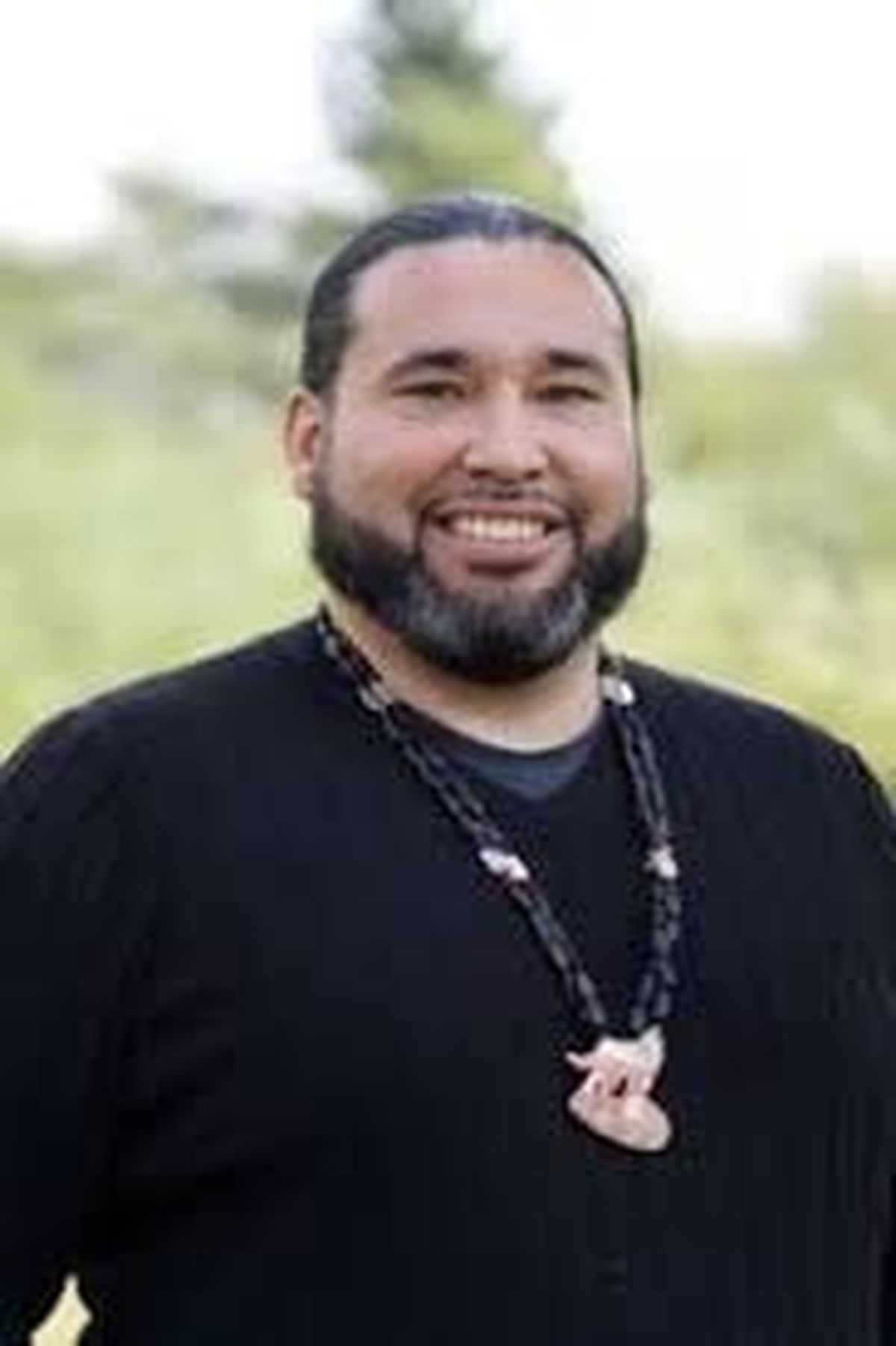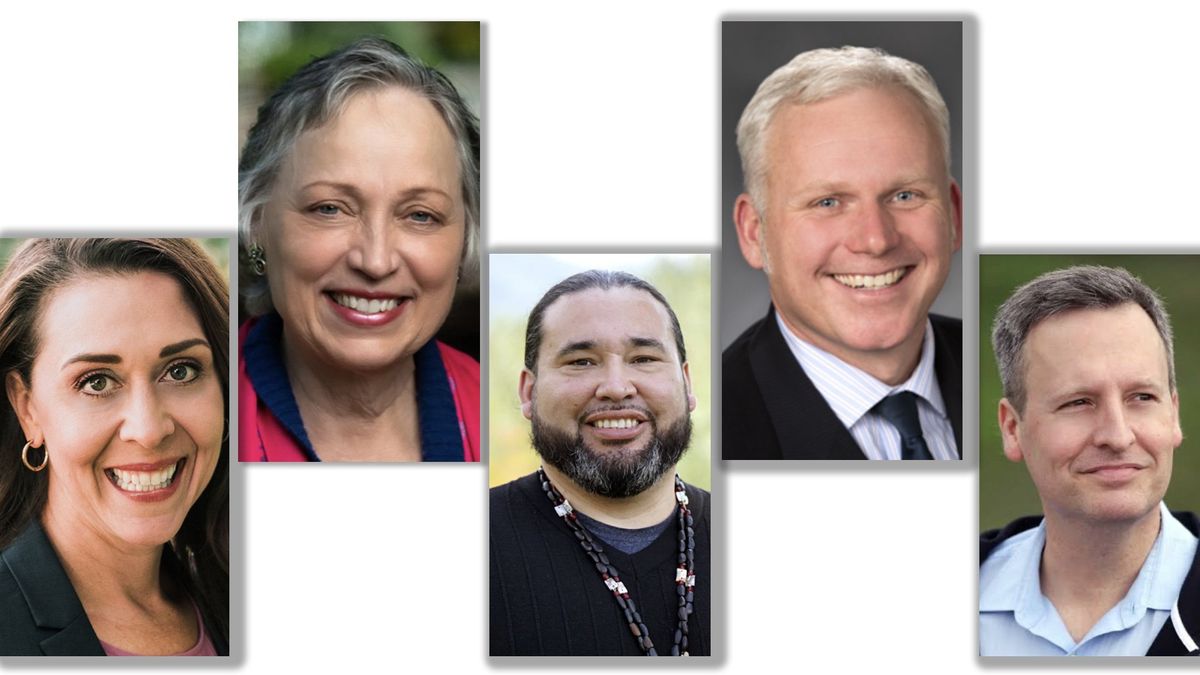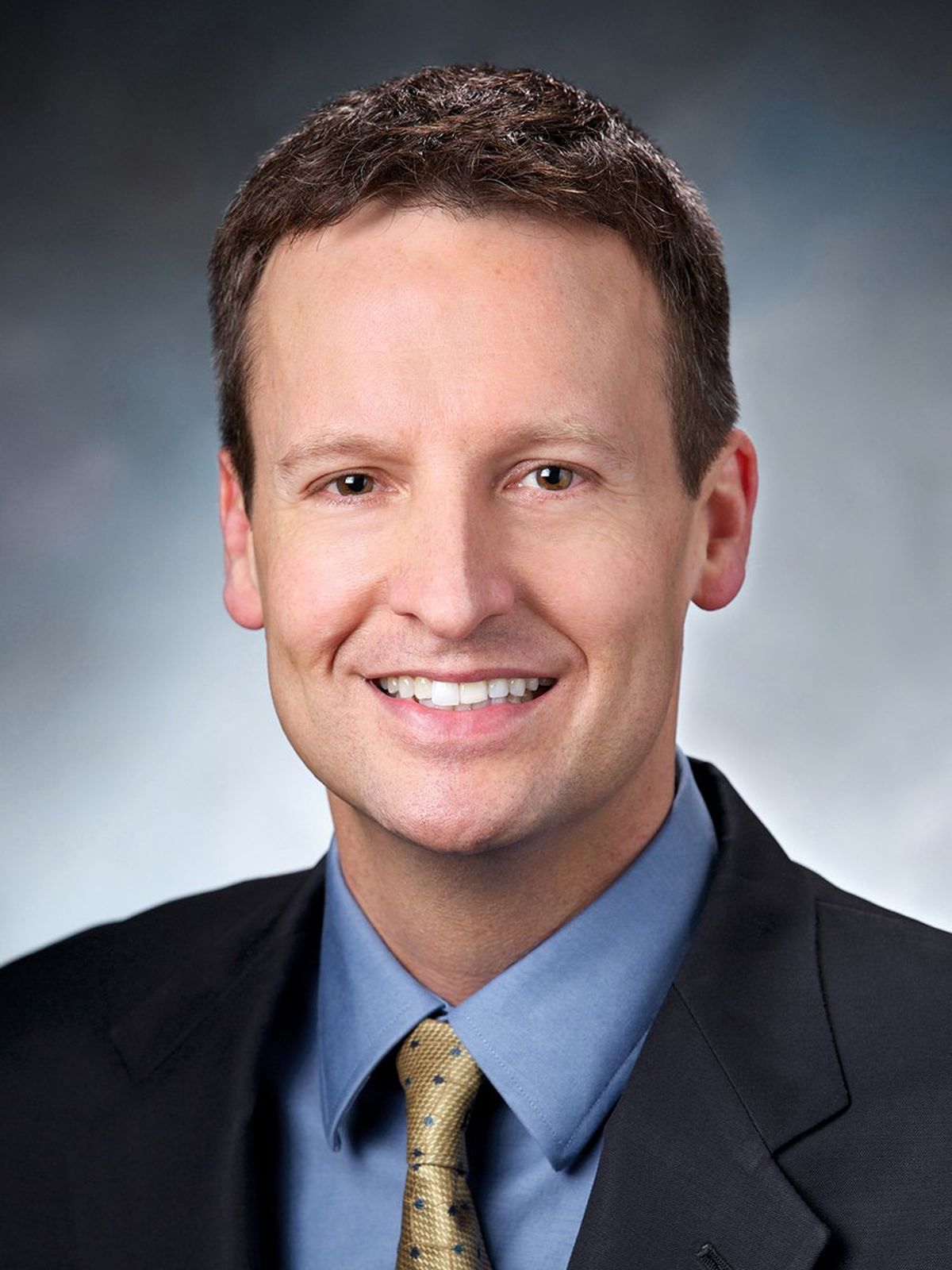Washington state will soon elect a new lands commissioner in the midst of a climate crisis. Here’s who’s running for office.
Jaime Herrera Beutler, Sue Kuehl Pederson, Patrick DePoe, Kevin Van De Wege and Dave Upthegrove are running for Washington state public lands commissioner in the Aug. 6, 2024 primary.
As longer, hotter summers continue to light the state’s forests on fire and climate change sparks debates over how best to power the state, Washington state’s next Commissioner of Public Lands will have a lot on their plate.
The state Commissioner of Public Lands oversees Washington’s massive Department of Natural Resources – an agency in charge of nearly 6 million acres of forests, beaches and other public lands. The commissioner also runs all firefighting efforts on state-managed lands.
Current Democratic lands commissioner Hilary Franz announced earlier this year she will step down from her post after seven years of running the state agency to embark on a run for Congress. A crowded August primary ballot will feature a list of contenders vying to take Franz’s place.
At the top of mind for all the candidates running for lands commissioner is the growing number and severity of devastating wildfires the state has seen year after year. Here are a few of the front-runners:
Patrick DePoe
Patrick DePoe serves on the executive team of the state Department of Natural Resources. A former Makah Tribal Council Leader from Neah Bay, Depoe has experience as a former co-chair of the state Environmental Justice Council. DePoe said his work experience as a captain with the National Response Corporation gives him hands-on experience responding to environmental emergencies.
If elected, DePoe would be the first Native American elected to statewide office in Washington. He is running as a Democrat.
“With the Makah Tribe, I’ve worked on sustainable harvest. I’ve worked on our shoreline response,” DePoe said. “I’ve been on the front lines digging fire lines to protect neighborhoods. All the work that DNR actually covers. In a sense, this is what I’ve been doing my entire life.”
If elected, DePoe said he would work to bolster the state’s firefighting forces and hire more full-time firefighting staff. He said he also wants to bring tribal ecological knowledge into the daily functions of the Department of Natural Resources.
DePoe said the Department of Natural Resources is the least diverse department in the state of Washington, which he said is unacceptable.
“I think we can do a better job at recruiting in different areas and making sure that folks are realizing: It’s not just forestry jobs at DNR. It’s not just wildland fire response,” DePoe said. “It’s also HR. It’s also admin. It’s communication. It’s government affairs.”
When asked what sets him apart from his opponents in the race, DePoe said it goes straight to his experience.
“As a tribal leader, I’ve been working with our cities, our counties, our state and at the national level,” DePoe said. “I’ve had multiple meetings at the White House. But at the same time, as tribal leaders, we also have that management. You know – I’ve managed an organization of over 400 employees.”
Jaime Herrera Beutler
Jaime Herrera Beutler is a former U.S. representative who served for the 3rd Congressional District in southwest Washington from 2011 to 2022.IShe lost her bid for re-election in 2021, the same year she voted to impeach former President Donald Trump for his role in the Jan. 6, 2021, insurrection. Three years later, she has returned to politics and hopes to use her Congressional experience as the state’s next lands commissioner.
Herrera Beutler, a Republican, said she’s running because she doesn’t want to leave our children and grandchildren with a legacy of burning forests and choking smoke.
Roughly 49% of the state-owned forest land is trust land that is supposed to be managed by the Department of Natural Resources, Herrera Beutler said.
She aims to ensure the department would be “managing those lands to the fullest” through thinning and sustainable timber harvesting.
“I grew up down here in southwest Washington, right next to the Gifford Pinchot National Forest,” she said. “Our national forests are in disarray – at least here in Washington state. On state forest lands, there’s silviculture work that needs to get done.”
Herrera Beutler said forest maintenance projects get pulled off the docket in Washington due to political pressure, and she wants to change that.
“There’s like three different sales in Thurston County right now in that 49% of trust lands that are supposed to be harvested. They have been set aside due to political pressure,” she said. “That would be more than $11 million to Thurston County schools.”
Herrera Beutler said setting forests aside for preservation and not touching them isn’t always the answer.
When asked what sets him apart from her opponents in this race, Herrera Beutler said she is unique because she’s not beholden to special interests or the base of her party.
“Our state is run by a single party. I don’t care what your party is. Any time that happens, especially over decades, you become beholden to a small fringe in your base,” Herrera Beutler said. “That’s what’s happening on the resource side.”
Sue Kuehl Pederson
Sue Kuehl Pederson is a retired career scientist and energy professional who grew up in Washington. She said she’s running as a Republican for commissioner of public lands to honor the 1.68 million voters who supported her in her 2020 bid for the office.
Growing up near the Columbia River Gorge on a salmon hatchery, Kuehl Pederson said the wonders of the natural world inspired her to become a fisheries biologist in the field of natural resources. She also worked as a power manager with Seattle City Light and the Grays Harbor PUD.
In 2014, Kuel Pederson said she began noticing forest fires emitting white smoke, unlike the gray smoke she grew up seeing rise from wildfires. She looked into it, she said, and found out that it’s largely a function of failing to harvest trees that were planted for timber harvest.
“We left trees growing that are too close together to thrive and actually turn into old growth forests – they’re too crowded,” Kuehl Pederson said. “These forests don’t even get enough light to the ground to have a healthy understory. The dead understory is very good for fire starters.”
Consequently, the fires igniting in the state are burning at temperatures much hotter than her childhood. To combat this, Kuehl Pederson said the state needs to create fire breaks through cutting down trees to break up forests into segments. The forests also need to be significantly thinned, she said.
Kuehl Pederson also said she wants to revive the state’s lumber mills and bring back large log-cutting saw blades to the state.
“Trees are a renewable resource,” Kuehl Pederson said. “It’s foolish to let them just burn up. I have ideas for creating jobs and supplying building materials in an area with a housing shortage.”
When asked what sets her apart from her opponents in this race, Kuehl Pederson said she’s the only candidate running with 30 years of natural resource management experience.
“I chose to become a Republican because I learned that Republicans support limited government,” she said. “I feel strongly that the government in my lifetime has just added more and more restrictions on the people.”
Kevin Van De Wege
Kevin Van De Wege is a lifelong career firefighter and longtime state lawmaker. He’s serving his second term in the state Senate where he chairs its Agriculture, Water, Natural Resources and Parks Committee. Before the Senate, Van De Wege, D-Sequim, served five terms in the state House of Representatives.
He said he decided to run for lands commissioner over his concern for wildfires in the state.
“I think my legislative background – having served 18 years there – and being a 25-year career firefighter, I’m uniquely positioned to get in and actually do something about the growth of wildfires,” he said.
To accomplish this goal, Van De Wege said he wants to drastically increase the amount of prescribed forest burning done by the state. Prescribed burning is the controlled use of fire to thin out vegetation and reduce wildfire hazards. Right now, the state burns about 10,000 acres a year of land through prescribed burning. Van De Wege wants to up that number to 100,000 acres annually.
“States like Florida – which geographically is smaller than Washington state – do seven times the amount of prescribed burning we do,” Van De Wege said, “and they’re still compliant with their federal clean air permit.”
Van De Wege added that he thinks the Department of Natural Resources’ firefighting staff is “undertrained, underappreciated and underpaid.” If elected, Van De Wege said he’d lobby to get more state funding for that workforce and use some of it to buy new firefighting airplanes and helicopters.
When asked what sets him apart from his opponents in the race, Van De Wege said he’s the only one in the race that has both legislative connections and a background in firefighting.
Dave Upthegrove
Dave Upthegrove is the current chair of the King County Council. He previously spent 12 years serving South King County in the state House of Representatives. A resident of Des Moines, Upthegrove said his years in politics have built him trust and friendships in the community.
Upthegrove said he’s running, in part, because there’s a culture change needed in the Department of Natural Resources and in the greater forestry industry – both through diversifying hiring practices and in educating staff in their cultural competencies and how they engage with the community.
When asked how he’d accomplish this, Upthegrove said he’d build upon work he’s done on the county and state level representing one of the most diverse regions in the entire state.
“When I first started, I would read about an organization in the paper,” Upthegrove said, “like the Iraqi Community Center opening their doors. So I’d literally almost just cold-call them: ‘I’m your county council member and I’d love to learn about what you’re doing.’ And then maybe I’d follow up with a cup of coffee with the director and find a way to help them.”
Upthegrove said his decision to run for lands commissioner is the culmination of a life and career spent on the environment and natural resource issues, rather than a “stepping stone” to higher office. If elected, he said he’d take a pay cut from his current gig.
If elected, the Des Moines resident said he’d like to take a stronger environmental approach around forestry policy, particularly in protecting “almost old growth forests” from timber harvests – which comprise about 3% of state-owned forests.
Upthegrove said the state needs to be doing five times as much effort as it’s currently doing for forest health management, including prescribed burns and noncommercial thinning.
When asked what sets him apart from his opponents in this race, Upthegrove said he’s the only leading candidate in the race who made the decision not to accept campaign contributions from the timber industry, their corporate executives or their lobbyists.





